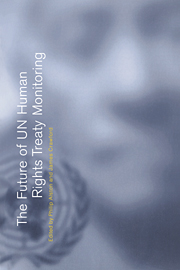Book contents
- Frontmatter
- Contents
- List of Tables, Figure, Appendices
- Notes on Contributors
- Editors' Preface
- Table of Treaties
- Table of Cases
- List of Abbreviations
- 1 The UN human rights treaty system: A system in crisis?
- A The UN human rights monitoring system in action
- 2 Individual claims in a world of massive violations: What role for the Human Rights Committee?
- 3 Decision-taking in the Committee on the Elimination of Racial Discrimination
- 4 The Committee on the Elimination of Discrimination against Women at the crossroads
- 5 The reporting process under the Convention on the Rights of the Child
- 6 The Committee on Economic, Social and Cultural Rights: Catalyst for change in a system needing reform
- 7 Country-oriented procedures under the Convention against Torture: Towards a new dynamism
- 8 UN human rights reporting procedures: An NGO perspective
- B National influences and responses
- C Regional and sectoral comparisons
- D Common challenges for the treaty bodies
- E Looking to the future
- Index
8 - UN human rights reporting procedures: An NGO perspective
Published online by Cambridge University Press: 23 December 2009
- Frontmatter
- Contents
- List of Tables, Figure, Appendices
- Notes on Contributors
- Editors' Preface
- Table of Treaties
- Table of Cases
- List of Abbreviations
- 1 The UN human rights treaty system: A system in crisis?
- A The UN human rights monitoring system in action
- 2 Individual claims in a world of massive violations: What role for the Human Rights Committee?
- 3 Decision-taking in the Committee on the Elimination of Racial Discrimination
- 4 The Committee on the Elimination of Discrimination against Women at the crossroads
- 5 The reporting process under the Convention on the Rights of the Child
- 6 The Committee on Economic, Social and Cultural Rights: Catalyst for change in a system needing reform
- 7 Country-oriented procedures under the Convention against Torture: Towards a new dynamism
- 8 UN human rights reporting procedures: An NGO perspective
- B National influences and responses
- C Regional and sectoral comparisons
- D Common challenges for the treaty bodies
- E Looking to the future
- Index
Summary
Introduction
This chapter is written from the perspective of a large international non-governmental organisation (NGO): it seeks to share some of the experiences which Amnesty International has had with the UN treaty bodies. Amnesty International operates in several different contexts within the UN system. The organisation works with the political bodies (the Security Council, General Assembly and Commission on Human Rights), as well as with the various agencies, expert bodies, and field operations.
The first thing that strikes one when considering the use made of the treaty bodies by NGOs is the ‘splendid isolation’ of the treaty bodies from the rest of the UN system. The treaty bodies are considered by some to be the heart of the human rights system, and the treaty bodies see themselves as the hub around which others should circle. The reality is that the treaty bodies are becoming more and more peripheral to the UN system and need to reach out to establish new links. In preparing this chapter the author spoke to two former UN officials who had headed UN human rights field operations. Neither ex-director could remember having had any contact or use for the treaty bodies. They considered the treaty bodies irrelevant for the ‘real’ human rights work which was being performed in the country. This chapter will highlight the need for new links to the treaty bodies and will put forward a series of suggestions for a more integrated approach to human rights monitoring in the UN system.
- Type
- Chapter
- Information
- The Future of UN Human Rights Treaty Monitoring , pp. 175 - 198Publisher: Cambridge University PressPrint publication year: 2000
- 7
- Cited by



